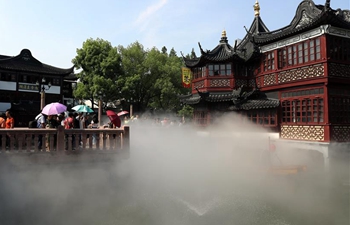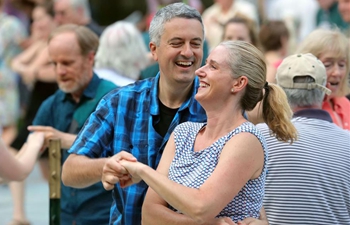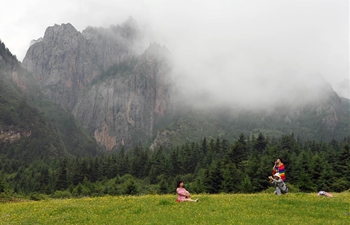BEIJING, June 29 (Xinhua) -- As vibrant music echoed across a public square in Beijing, a group of people stood in lines to dance, tapping the ground and moving their feet with swift heel-and-toe movements.
The dance is called the Melbourne shuffle, or shuffle dance, that originated in Australia in the 1980s. With energetic steps, it is becoming a new form of "square dance" occupying China's urban spaces from parks to plazas and a popular pound-losing exercise for many elderly and middle-age Chinese.
Han Gong, 59, a musical instrument repairer, joined a shuffle dancing team in Beijing in 2017. He said his daily dances in public spaces help him fend off high blood pressure and loneliness.
"My belly used to hang over my belt but now it's flat," Han said. Previously, he had tried a variety of exercises, including running, but few lasted over a week. "I prefer group activities, and then luckily, I found the shuffle dance."
In the beginning, Han felt embarrassed when people gathered around to look at him, but he changed his mind when seeing an obese man dancing with ease. "I asked myself, 'why not have a try?'" he said.
Han started to learn from an online video and practiced in front of the mirror. After two months of hard practicing, he no longer "danced like a clumsy duck," but successfully blended in with the group.
"My shirt becomes drenched in sweat within half an hour," Han said with beads of sweat dripping down his forehead. "The shuffle dance has reminded me about the importance of exercise."
Lin Xiuhong, 40, joined the same dance team one year ago. "My feet were tingling when it was near 6 p.m., which means it is time to dance," she said.
Now, Han's team has some 50 members from all walks of life, mostly the elderly and middle-aged. They change their dance routine about once a week and are keen on introducing new skills and styles via the Internet.
On China's video-sharing platform Kuaishou, about 37,000 videos are related to the Melbourne shuffle. And related videos have been viewed over 560 million times on another short video platform Douyin (Tik Tok).
The dance form has even been introduced in a number of primary and middle schools in provinces of Gansu, Shandong and Jilin. Even some restaurants encourage their staff to learn the dance to attract customers.
In April, a video showing a primary school headmaster leading over 700 students in performing the exotic dance in north China's Shanxi Province went viral on the Internet.
"The traditional morning exercises are tedious for some students, but the popular shuffle dance has aroused their interest in exercise," the headmaster Zhang Pengfei said.
In May, a shuffle dance competition debuted in the northeastern province of Jilin with 22 participating teams. Another performance will be held in the neighboring Liaoning Province in July.
"Chinese people now have more choices for exercise, such as yoga, hip-hop and shuffle dance, and are increasingly enjoying the benefits of exercising," Han said.

















